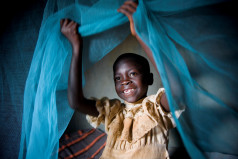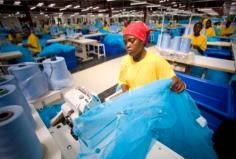Preventing the spread of infectious disease due to climate change
SUMITOMO CHEMICAL COMPANY, LIMITED
It is feared that the global rise in temperature associated with climate change will transform and expand the habitats of infectious disease vectors and host organisms, leading to outbreaks of infectious diseases in new territories and increasing numbers of patients. SUMITOMO CHEMICAL COMPANY, LIMITED developed "Olyset® Net," a mosquito net used to help prevent the spread of malaria. In 2001, the "Olyset® Net," was acknowledged by the WHO as the first long-lasting insecticidal net of its kind. Preventing the spread of infectious disease due to climate change is an adaptation measure in the field of health and sanitation.
| Publication date | March 13, 2017 |
|---|---|
| Sector | Human Health |
Company Overview

Sumitomo Chemical was founded in 1913 to manufacture fertilizers from sulfur dioxide emitted by smelting operations at the Besshi Copper Mine in Niihama, Ehime Prefecture, Japan, with the aim of alleviating the air pollution caused by the emissions. The Company, together with its over 100 Group companies, currently supplies products worldwide to support a wide range of industries and enrich the daily lives of people in five sectors: Petrochemicals & Plastics, Energy & Functional Materials, IT-related Chemicals, Health & Crop Sciences and Pharmaceuticals.
Adaptation Initiatives
Preventing the spread of infectious disease due to climate change
[Products and Technologies]
"Olyset® Net" was developed based upon extensive research and development that applied the technologies used for mesh screen employed in factories as a bug shield in an attempt to help prevent the outbreak of malaria. The net is made of polyethylene resin woven with insecticide agent for gradual surfacing, which helps maintain the repellant effect for a long period after repeated washing.
[Project Details]
Sumitomo Chemical provides "Olyset® Net" for regions where there are fears of an increase in infectious diseases transmitted by mosquitoes as a result of expansion in mosquito breeding areas due to climate change. The Company started local production in September 2003 through a grant of manufacturing technology to A to Z Textile Mills Limited in Tanzania. To meet surging demand, "Olyset® Net" Production Company was set up as a joint venture with A to Z Textile Mills Limited, through which as many as 7,000 job opportunities were generated and the regional economy was boosted. In 2010, the Company built a production framework that, combined with Asian production bases, is aggregately capable of manufacturing as many as 60 million units annually. The products are now supplied to more than 80 countries through such international organizations as The Global Fund and UNICEF. Furthermore, the Company has launched sales to general consumers through local supermarkets in Kenya and several countries in Asia since 2011 to develop diverse sales channels.




